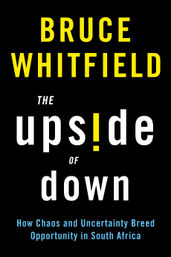The Upside of Down, now available on eBook
Pan Macmillan is delighted to be publishing Bruce Whitfield’s book now available on eBook (and in-stores after the national lockdown). The Upside of Down tells remarkable stories of remarkable people and paints a picture of a South Africa very few people dare to imagine.

Next time you go to a conference or hire a consultant to be told, ‘We live in a VUCA [Volatile, Uncertain, Complex, Ambiguous] world,’ leave the room. You are wasting your time.
In a world of fake news, deep-fakes, manipulated feeds of information and divisive social-media agendas, it’s easy to believe that our time is the most challenging in human history. It’s just not true.
It is a time of extraordinary opportunity. But only if you have the right mindset. Fear of the future breeds inaction and leads to strategic paralysis. We put off decisions until we can have certainty. We look for signals. We wait. And while we do that, the world moves on around us.
Problem solvers thrive in chaotic and uncertain times because they act to change their future. Winners recognise that in a world of growing uncertainty, you need to resort to actions on things you can control. And the only things over which you have absolute control are your attitude and your mindset. These, in turn, determine the actions you will take and that will define your future. A robust mindset is the one common characteristic Bruce Whitfield has identified in two decades of interrogating how South Africa’s billionaires and start-up mavericks think differently. They are not naive Polly-Annas. They don’t ignore risk or hope that problems will go away. They constantly measure, manage, consider and weigh up opportunities in a tumultuous sea of uncertainty and find ways around obstacles.
If, as Nobel Prize-winning economist Robert Shiller suggests, the stories we tell affect economic outcomes, then we need to tell different stories amidst the noise and haste of a rapidly evolving world.
Find out how chaos and uncertainty can breed opportunity in South Africa, get the eBook version here:
In this exclusive video, Bruce introduces his eagerly awaited book, The Upside of Down.
Bruce Whitfield has won more awards for financial journalism than any other working South African media professional. His daily Money Show on 702 and Cape Talk is compulsory listening for anyone who wants to know what is happening in the political economy. Whitfield presents Taking Stock on eNCA and is a contributing editor at The Financial Mail. He is a sought-after public speaker who thrives on challenging audiences to think differently about the risks and challenges posed by the complex South African environment.
The Upside of Down
by Bruce Whitfield
Next time you go to a conference or hire a consultant to be told, ‘We live in a VUCA [Volatile, Uncertain, Complex and Ambiguous] world,’ leave the room. You are wasting your time.
In a world of fake news, deep-fakes, manipulated feeds of information and divisive social-media agendas, it’s easy to believe that our time is the most challenging in human history. It’s just not true.
It is a time of extraordinary opportunity. But only if you have the right mindset. Fear of the future breeds inaction and leads to strategic paralysis. We put off decisions until we can have certainty. We look for signals. We wait. And while we do that, the world moves on around us.
Problem-solvers thrive in chaotic and uncertain times because they act to change their future. Winners recognise that in a world of growing uncertainty, you need to resort to actions on things you can control.
And the only things over which you have absolute control are your attitude and your mindset. These, in turn, determine the actions you will take and that will define your future.
A robust mindset is the one common characteristic Bruce Whitfield has identified in two decades of interrogating how South Africa’s billionaires and start-up mavericks think differently. They are not naive Pollyannas. They don’t ignore risk or hope that problems will go away. They constantly measure, manage, consider and weigh up opportunities in a tumultuous sea of uncertainty and find ways around obstacles.
If, as Nobel Prize-winning economist Robert Shiller suggests, the stories we tell affect economic outcomes, then we need to tell different stories amidst the noise and haste of a rapidly evolving world.
